Shandur Pass, Pakistan
It was 1987, in the mountains between Chitral and Gilgit. Having found a jeep in Chitral, it seemed that the journey would not take long. The lack of fuel in the Chitral area meant that the driver got as far as Buni and then refused to go any further. Instead, I continued on foot as far as Mastuj, where the local police invited me to stay with them in the Fort. In the morning, I continued on foot to Sol Laspur, where I stayed with a family overnight. In the morning, I set off up the mountain to Shandur Pass.
The track climbed steeply at first and then curled round to the right. Seeing a well‑worn path, I left the road and walked to the top of the rise ahead of me. Before me stretched the twisting gorge cut by the river and the sight of the village of Laspur dwarfed by the towering bulk of the snow-clad mountains on all sides. I clambered down and rejoined the track. Following in the footsteps of all those who came before me, I walked along the rock track as it twisted and wound its way down to the valley floor. The ground rumbled with the growl of the torrent below and the wind snatched tears from my eyes. The landscape was overpoweringly beautiful.
I pushed on through the village of Laspur, climbing steadily up the other side of the valley, following the contours and trying to shorten the route as far as I could. A herd of grazing yak ignored me as I clambered upwards. In the distance, a woman dressed in a red shalwar kameez struggled down towards Laspur, burdened with a huge pile of brushwood. At first, I made every effort to avoid her, but it soon became apparent that she was trying to cross my path. Stories of Europeans being shot in these mountainous regions for talking to women made me nervous about getting too close to her. When she waved at me, there was no doubt that she wanted to meet me, so I took my life in my hands and walked towards her.
When we met on the side of a mountain high above the villages, she showed me an open wound on her finger that had been rubbed raw by the kindling she had been collecting. My fame as a supposed healer had spread far and wide. With tube of antiseptic cream and a simple Band-Aid, I made her a happy woman. With her surprisingly strong hands, she grasped my hand and thanked me profusely. Her face was covered in a protective layer of ash that helped protect her skin from the sun and wind. The grey woollen shawl that covered her head and shoulders was made from the finest wool. The edges of the shawl were delicately embroidered with flowing symmetrical patterns sewn in orange and green silk. It seemed far too precious to be worn on the side of a mountain.
For a few minutes, she and I talked as best as we could, before parting on our respective ways. With a low grunt, she heaved her load on to her shoulder and set off down the mountainside towards Laspur, turning briefly to flash me a radiant smile of thanks.
Within minutes, she was little more than a splash of colour on an otherwise grey backdrop. Other than a herd of yak, there was nothing between the Shandur Pass and me.
Overhead, the clouds were grey and ominous and blocked out the sky. They clung stubbornly to the highest peaks and pressed down towards the ground. Half buried in snow, the mountains were blue with cold and crowded together so it was hard to see how there could be a way through them. A snowstorm would not have been helpful. I had to keep moving.
As I climbed higher, the air got colder and I had to stop to put on my pullover and down jacket. At least conditions for me were not as bad as those faced by Surgeon Major Robertson when he crossed the Pass on his way from Gilgit to Chitral in late January 1885:
“Every care was taken of the Sepoys, who were provided with Balaclava caps and snow goggles and had their feet cased in strips of blanket, sent up by the careful Baird. Gloved, with thick wrappings on their feet and woollen mufflers on their faces, the men looked comfortable in yellow sheepskins worn over their greatcoats and trudged sturdily.”
Wrapped in a down jacket, I trudged as sturdily as I could, imaging meeting Robertson’s men as they crossed the flat plain at the top of the pass towards me. Today, the wind was cold, but bearable. Robertson recorded the cold conditions at his camp in Langar on the far side of the pass on the eve of his crossing:
“It was almost impossible to keep warm, even beneath a mountain of blankets and furs. Revolvers felt sticky, while iron tent pegs could not be touched with the bare hand.”
The snow line was above me and if the weather held, I would be over the Pass in a couple of hours. As I climbed, the effects of the high altitude began to slow me down. I had to stop to rest every five minutes and felt weakened by the combined effects of amoebic dysentery and the thin air. The effort of walking left me noticeably breathless. My muscles cramped easily and I had a slight headache. I knew that these were some of the first symptoms of altitude sickness. However, if all went well, I would be over the pass by two and in Langar on the other side by six or seven in the evening at the latest.
I reached the mountain plain that marks the highest point on the Pass at two and found that most of the track was clear of snow. The snow that remained was frozen solid and I walked on top of it without difficulty. The air smelled fresh and as the slope levelled off, I made good progress.
The track that continued past the lakes that straddle the Pass was deeply rutted by centuries of use. The silence of the mountain was broken only by the sound of snow sliding off reeds growing at the edge of the lake into the cold, clear water.
A tall, bearded rider on a brown pony heading towards Gilgit overtook me, greeting me with a polite as-salaam alikum and a salute. He trotted on towards the distant horizon and was soon out of sight.
“Bastard!” I thought, quite unreasonably.
“Next time,” I screamed into the passing wind. “Next time, I’ll bring a bloody horse.”
Walking on the level was relatively easy and I made good time, passing along the length of the lake. In the distance, I could see two army huts used by the Chitral Guides standing by the famous Shandur Pass polo ground. It is the highest polo ground in the world and is used each year to stage a polo match between Chitral and Gilgit.
I decided to visit the soldiers camped in the hut, on the very good chance that they might have offered me a cup of tea. When I got there, the open hut was deserted, with only a smouldering fire providing evidence that they had been here at all. A pot of reed roots gathered from the lake simmered on the embers and looked most unappetising. The other hut was locked and seemed to be empty.
I brewed up a cup of coffee and a plate of steaming porridge and sat back to wait for their return. As I rested, lethargy set in and I dozed for a while. It was tempting to relax and think of the long walk ahead some other time. Maybe the soldiers would let me sleep in one of the huts. It would have been nice to watch the sun rising over the pass. At four in the afternoon, the door of the other hut opened and two bleary-eyed soldiers appeared.
The sergeant was not pleased to see me and made it clear that unless I paid him a substantial bribe, I would have to leave.
“This not tourist camp. This is Army camp,” he blustered and shambled off for a shit. Perhaps he was right, but did he have to be so unpleasant?
“You are a little shit,” I muttered as he squatted down by the lake.
As I repacked my bag, the private offered me a cup of tea from a thermos flask. I gave him a packet of porridge oats in return, which he hid from the sergeant. There was something about his manner that made me wonder what the two men were doing in bed together in the middle of the afternoon. The sergeant really was an unpleasant little man and was clearly not happy for me to be here.
When he came back from his ablutions, he repeated his demand for money. His tone made me nervous and just a little angry.
Without too much thought, I shouldered my pack and stormed off down the mountain. An hour later, I began to calm down and the reality of my situation started to dawn on me. I was at least three or four hours from the nearest village and there was less than one hour of daylight remaining. I kept walking, somehow convinced that I would be all right and that something would turn up. If all else failed, there were enough big boulders under which I could shelter. The clouds sank lower and a fine drizzle enveloped the world. I kept walking. This was either a moment of mountain madness or a moment of great faith.
Ten minutes later, I rounded a corner and found myself face to face with a man standing on the track. He stared at me in astonishment. As I approached him, three more men appeared and watched me approach. They were almost as surprised to see me, as I was to see them as we were both at least four hours from the nearest village and the light was beginning to fail.
After a brief discussion in broken Urdu, they convinced me to stay with them. It turned out that they were driving a herd of donkeys and cattle from Laspur over Shandur Pass to the village of Teru on the other side. Their animals were well hidden and penned inside a dry‑stone wall enclosure. This was a regular stopping off point. The oldest herder led me by the hand into a narrow slit in the mountainside that I would had never had noticed without his help and into a cave that had been hollowed out under a boulder the size of a house. After my experience with the sergeant on Shandur Pass, many thoughts crossed my mind as I was bundled through the entrance, most of which were not very palatable.
The roof was low and we had to walk in a crouched position. As my eyes adjusted to the gloom, I made out a pot of rice simmering over a fire towards the back of the cave. Elsewhere, their bags and blankets were scattered across on the cave floor. With certain amount of trepidation, I squatted in an empty corner and began to wonder if they were likely to slit my throat and rob me. They were a rough-looking crowd, but their first step was to offer me hot tea and some unleavened bread. Then they began trying to find out what I was doing alone on the side of a mountain, so late in the day. Seated on their best blanket and warmed by a blazing fire, I tried my best to answer their questions. Our lack of a common language made conversation less than easy. After a while, they gave up and continued with their preparations for the night.
They were all fasting and kept a close eye on the time as sunset approached. Outside, the animals were restless and needed constant attention. When the animals were finally settled, the men all crowded back into the cave and sat watching the minutes pass until the sun had officially set.
The oldest of the men sat under an umbrella at the mouth of the cave, watching his digital watch with great care. Sheets of rain started to swirl in through the cave opening and the umbrella tossed and turned with a life of its own. The old man kept his eyes glued on the glowing digits on his wrist.
The other three harangued him about the so-called accuracy of his digital watch, but he was resolute and until he was sure that the sun had set, he let no one near the food.
When at last, he declared that the sun had set, feasting began. The rice was heated up and a large pot of tea brewed. In return for my warm reception, I offered them the last of my sugar, a bag of green tea and a packet of mixed spices that I had bought in the bazaar in Chitral.
This was a mistake. For the remainder of my stay, I strived and failed to convince the cook that I did not drink only green tea and no matter what the circumstance, I did not want mixed spices added to my tea. Every time I tried to explain that the green tea and spices were a gift, I thought that the message had been understood. But shortly afterwards the cook did something with either the green tea or the spices that showed me that he had no idea what I was saying.
Only one of them spoke any Urdu and his accent was so thick that I could barely understand anything he said. He was the cook, the youngest of the group and had decided to teach me to speak his local dialect. My nightmare lesson in Chitrali – or whatever language it was – began with him asking me to repeat the names of objects in the cave. If I pronounced a word wrongly or forgot, he repeated the word louder or more quickly. With his face close to mine, he screamed each word into my ear and covered me with his spittle. His grin told me that he was enjoying this bizarre form of torture.
If it had not been for the digital watches and the umbrella erected to stop the worst of the rain blowing into the cave, I could had been forgiven for thinking that I had tumbled into a Neolithic homestead. As the temperature dropped steadily, more fuel was piled on to the fire, filling the air with acrid, choking smoke. Any heat produced by the fire escaped through the cave entrance and was replaced by icy draughts of mountain air. The lesson continued and my failure to learn quickly enough was irritating my instructor to the point of distraction. With eyes and nose streaming because of the fumes, I tried hard to please my tormentor and wondered how much longer he would keep up this misery.
An age later, he gave up and at last, we prepared for sleep. I was given a blanket but not allowed to use it to insulate myself from the cold, damp cave floor. Instead, it was placed on top of me. Freezing rainwater soon dripped down from the roof of the cave, through the blanket and down my back. The shivering soon started and I felt like shit.
Moments after I finally managed to get to sleep, a sudden scream fractured the still of the night and I sat up with a start to see the herders scrambling into the night through the narrow cave entrance. A predator had spooked the animals – perhaps a wandering snow leopard. I could hear the men shouting to try to scare it way. Peace finally returned and I spent what was left of the night shivering under the blanket, with the chill of the freezing ground eating into my side.
Relief came at three in the morning as the herders began to stir and get breakfast underway. Once again, the fire was stoked up and once again, the cave filled with choking smoke. The back of my throat and my eyes felt raw and my nose ran uncontrollably. I would have preferred tear gas.
My tormentor brewed a pot of tea and re-heated the rice until it burned on the bottom of the pan. The eating cloth was spread out again and we ate in silence. As the food was cleared away, my torment entered its second stage. He spoke to me in unintelligible Urdu, but his intentions were very clear.
“You have had a good sleep? Now we will go over last night’s lesson.”
With my head muzzy from lack of sleep, the altitude, the cold and the exertions of travel, my brain was in no fit state to learn, but he was relentless and hammered me on every word. He would not move to the next word until I had managed to produce a reasonable pronunciation. For the best part of half an hour, he screamed at me, laughing like a maniac at my many mistakes.
In revenge, I did the same to him and got him to repeat the names of objects in the cave in French. It was a futile exercise, but made me felt a little better. Eventually, the old man told him to leave me alone and pack away the kitchen.
Aching with the cold and exhaustion, I managed to crawl close enough to the remains of the fire to feel its magic working into my bones and fell asleep against a pile of brushwood.
In their world, I was out of place and they treated me like a moron to be looked after but also to be played with. In some ways, they were right – I could not speak their language at all and could only speak as much Urdu as a rather slow two-year old. To make matters worse, I had managed to get myself stuck on the wrong side of a mountain on a very cold and wet night.
When the young cook found my plastic sugar container, he asked if he could keep it – so I gave it to him. He struggled for a few minutes to close it and was red faced when I offered to take it off him and clicked the lid back in place with a single motion of my thumb. He quickly slipped the container in his bag, trying to hide his embarrassment.
Outside the cave, the sun was shining and the sky clear. Before leaving, I took a photograph of my hosts standing in front of their cave. When the posing was over, the men all wanted to look at my camera but needed help from me to operate the zoom lens. They scanned the mountains and smiled as the viewfinder brought distant objects a little closer. The young cook was still sulking. After I replaced the lens cap, he came forward and snatched the camera out of my hand. For a few fruitless minutes, he tried to see what his friends had been seeing and in the end returned the camera without a word. When I showed him how to take off the lens cap and work the zoom lens, his sullen glower was finally replaced by a smile. With a sweeping gesture, he looked out down the valley and was transfixed. When at last he gave the camera back to me, we were friends and he shook my hand.
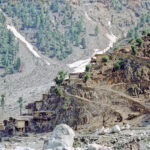
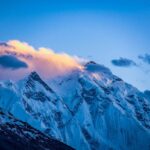
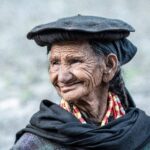
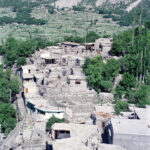
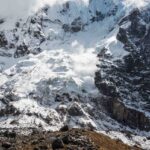

Leave a comment